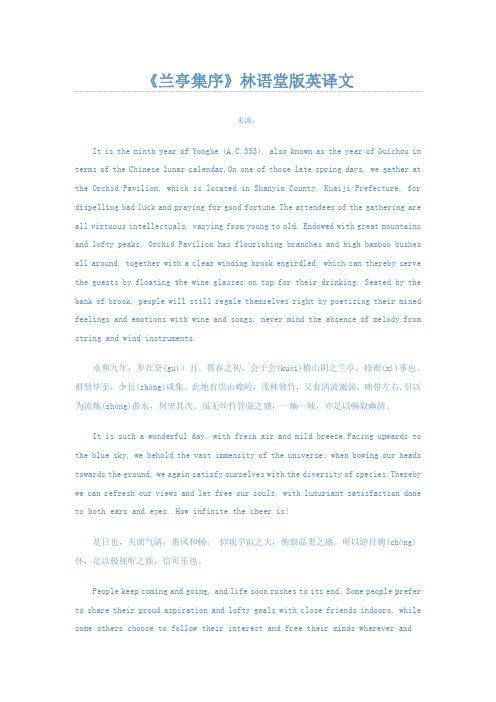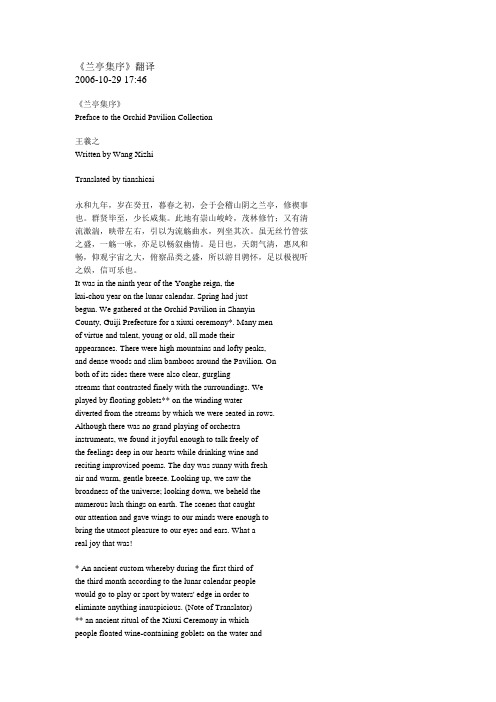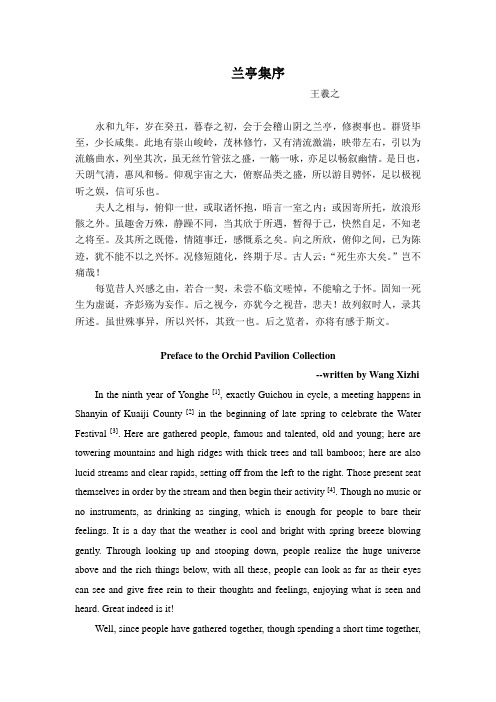《兰亭集序》林语堂版英译文
兰亭序原文及翻译

兰亭序原文及翻译兰亭序原文及翻译兰亭序,又名《兰亭集序》、《兰亭宴集序》、《临河序》、《禊序》、《禊帖》。
晋代书法家,会稽内史王羲之撰写。
下面,小编为大家分享兰亭序原文及翻译,希望对大家有所帮助!原文:永和九年,岁在癸丑,暮春之初,会于会稽山阴之兰亭,修禊事也。
群贤毕至,少长咸集。
此地有崇山峻岭,茂林修竹;又有清流激湍,映带左右,引以为流觞曲水,列坐其次。
虽无丝竹管弦之盛,一觞一咏,亦足以畅叙幽情。
是日也,天朗气清,惠风和畅,仰观宇宙之大,俯察品类之盛,所以游目骋怀,足以极视听之娱,信可乐也。
夫人之相与,俯仰一世,或取诸怀抱,悟言一室之内;或因寄所托,放浪形骸之外。
虽趣舍万殊,静躁不同,当其欣于所遇,暂得于己,快然自足,不知老之将至。
及其所之既倦,情随事迁,感慨系之矣。
向之所欣,俯仰之间,已为陈迹,犹不能不以之兴怀。
况修短随化,终期于尽。
古人云:“死生亦大矣。
”岂不痛哉!(不知老之将至一作:曾不知老之将至)每览昔人兴感之由,若合一契,未尝不临文嗟悼,不能喻之于怀。
固知一死生为虚诞,齐彭殇为妄作。
后之视今,亦犹今之视昔。
悲夫!故列叙时人,录其所述,虽世殊事异,所以兴怀,其致一也。
后之览者,亦将有感于斯文。
注释:永和:东晋皇帝司马聃(晋穆帝)的年号,从公元345—356年共12年。
永和九年上巳节,王羲之与谢安,孙绰等41人。
举行禊礼,饮酒赋诗,事后将作品结为一集,由王羲之写了这篇序总述其事。
暮春:阴历三月。
暮,晚。
会:集会。
会稽(kuài jī):郡名,今浙江绍兴。
山阴:今绍兴越城区。
修禊(xì)事也:(为了做)禊礼这件事。
古代习俗,于阴历三月上旬的巳日(魏以后定为三月三日),人们群聚于水滨嬉戏洗濯,以祓除不祥和求福。
实际上这是古人的一种游春活动。
群贤:诸多贤士能人。
指谢安等三十二位社会的名流。
贤:形容词做名词。
毕至:全到。
毕,全、都。
少长:如王羲之的儿子王凝之、王徽之是少;谢安、王羲之等是长。
兰亭集序-林语堂翻译

《兰亭集序》林语堂版英译文来源:It is the ninth year of Yonghe (A.C.353), also known as the year of Guichou in terms of the Chinese lunar calendar.On one of those late spring days, we gather at the Orchid Pavilion, which is located in Shanyin County, Kuaiji Prefecture, for dispelling bad luck and praying for good fortune.The attendees of the gathering are all virtuous intellectuals, varying from young to old. Endowed with great mountains and lofty peaks, Orchid Pavilion has flourishing branches and high bamboo bushes all around, together with a clear winding brook engirdled, which can thereby serve the guests by floating the wine glasses on top for their drinking. Seated by the bank of brook, people will still regale themselves right by poetizing their mixed feelings and emotions with wine and songs, never mind the absence of melody from string and wind instruments.永和九年,岁在癸(guǐ)丑。
兰亭集序(中英)

《兰亭集序》翻译2006-10-29 17:46《兰亭集序》Preface to the Orchid Pavilion Collection王羲之Written by Wang XizhiTranslated by tianshicai永和九年,岁在癸丑,暮春之初,会于会稽山阴之兰亭,修禊事也。
群贤毕至,少长咸集。
此地有崇山峻岭,茂林修竹;又有清流激湍,映带左右,引以为流觞曲水,列坐其次。
虽无丝竹管弦之盛,一觞一咏,亦足以畅叙幽情。
是日也,天朗气清,惠风和畅,仰观宇宙之大,俯察品类之盛,所以游目骋怀,足以极视听之娱,信可乐也。
It was in the ninth year of the Yonghe reign, thekui-chou year on the lunar calendar. Spring had justbegun. We gathered at the Orchid Pavilion in ShanyinCounty, Guiji Prefecture for a xiuxi ceremony*. Many menof virtue and talent, young or old, all made theirappearances. There were high mountains and lofty peaks,and dense woods and slim bamboos around the Pavilion. Onboth of its sides there were also clear, gurglingstreams that contrasted finely with the surroundings. Weplayed by floating goblets** on the winding waterdiverted from the streams by which we were seated in rows. Although there was no grand playing of orchestrainstruments, we found it joyful enough to talk freely ofthe feelings deep in our hearts while drinking wine andreciting improvised poems. The day was sunny with freshair and warm, gentle breeze. Looking up, we saw thebroadness of the universe; looking down, we beheld thenumerous lush things on earth. The scenes that caughtour attention and gave wings to our minds were enough tobring the utmost pleasure to our eyes and ears. What areal joy that was!* An ancient custom whereby during the first third ofthe third month according to the lunar calendar peoplewould go to play or sport by waters' edge in order toeliminate anything inauspicious. (Note of Translator)** an ancient ritual of the Xiuxi Ceremony in whichpeople floated wine-containing goblets on the water andpicked those held back at the turns for drinking.(Noteof Translator)夫人之相与,俯仰一世,或取诸怀抱,晤言一室之内;或因寄所托,放浪形骸之外。
《兰亭集序》翻译

《兰亭集序》翻译永和九年,岁在癸丑,暮春之初,会于会稽山阴之兰亭,修禊事也。
永和九年,时在癸丑之年,阴历三月初,我们会集在会稽郡山阴的兰亭,(为了)做禊事。
群贤毕至,少长咸集。
众多贤才都会聚在这里,年龄大的小的都聚集在一起。
此地有崇山峻岭,茂林修竹,又有清流激湍,映带左右,引以为流觞曲水,列坐其次。
兰亭这地方有崇山峻岭环抱,林木繁茂竹篁幽密。
又有清澈湍急的溪流,辉映围绕在亭子的四周,引(清流激湍)来作为流觞的曲水,列坐在曲水之旁。
虽无丝竹管弦之盛,一觞一咏,亦足以畅叙幽情。
即使没有演奏音乐的盛况,只是饮酒赋诗,也足以令人畅叙幽深内藏的感情。
是日也,天朗气清,惠风和畅。
这一天,晴明爽朗,和风习习。
仰观宇宙之大,俯察品类之盛,所以游目骋怀,足以极视听之娱,信可乐也。
仰首可以观览浩大的宇宙,俯身可以考察地上万物的繁多,借以纵展眼力、开畅胸怀,足以极尽视听的乐趣,实在是人生的一大乐事。
夫人之相与,俯仰一世。
人与人相交往,很快便度过了一生。
或取诸怀抱,悟言一室之内;或因寄所托,放浪形骸之外。
有的人把自己的胸怀抱负在室内畅谈;有的人就着自己爱好的事物寄托自己的情怀,不受约束、自由放纵地生活。
虽趣舍万殊,静躁不同,当其欣于所遇,暂得于己,快然自足,不知老之将至;虽然他们各有各的爱好,安静躁动(的性格)各不相同,但当他们对所接触的事物感到高兴,一时感到自得,感到高兴和满足时,竟然不知道老年将要来到。
及其所之既倦,情随事迁,感慨系之矣。
等到对已获取的东西发生厌倦,情事变迁,又不免会引发无限的感慨。
向之所欣,俯仰之间,已为陈迹,犹不能不以之兴怀,况修短随化,终期于尽!以往所得到的欢欣,很快就成为历史的陈迹,人们对此尚且不能不为之感念伤怀,更何况人的一生长短取决于造化,而终究要归结于穷尽呢!古人云,“死生亦大矣”,岂不痛哉!古人说:“死生是一件大事。
”这怎么能不让人痛心啊!每览昔人兴感之由,若合一契,未尝不临文嗟悼,不能喻之于怀。
《兰亭集序》林语堂英译文

《兰亭集序》林语堂英译文It is the ninth year of Yonghe (A.C.353), also known as the year of Guichou in terms of the Chinese lunar calendar.On one of those late spring days, we gather at the Orchid Pavilion, which is located in Shanyin County, Kuaiji Prefecture, for dispelling bad luck and praying for good fortune.The attendees of the gathering are all virtuous intellectuals, varying from young to old. Endowed with great mountains and lofty peaks, Orchid Pavilion has flourishing branches and high bamboo bushes all around, together with a clear winding brook engirdled, which can thereby serve the guests by floating the wine glasses on top for their drinking. Seated by the bank of brook, people will still regale themselves right by poetizing their mixed feelings and emotions with wine and songs, never mind the absence of melody from string and wind instruments.It is such a wonderful day, with fresh air and mild breeze.Facing upwards to the blue sky, we behold the vast immensity of the universe; when bowing our heads towards the ground, we again satisfy ourselves with the diversity of species.Thereby we can refresh our views and let free our souls,with luxuriant satisfaction done to both ears and eyes. How infinite the cheer is!永和九年,岁正在癸(guǐ)丑。
《兰亭集序》英语译文

兰亭集序王羲之永和九年,岁在癸丑,暮春之初,会于会稽山阴之兰亭,修禊事也。
群贤毕至,少长咸集。
此地有崇山峻岭,茂林修竹,又有清流激湍,映带左右,引以为流觞曲水,列坐其次,虽无丝竹管弦之盛,一觞一咏,亦足以畅叙幽情。
是日也,天朗气清,惠风和畅。
仰观宇宙之大,俯察品类之盛,所以游目骋怀,足以极视听之娱,信可乐也。
夫人之相与,俯仰一世,或取诸怀抱,晤言一室之内;或因寄所托,放浪形骸之外。
虽趣舍万殊,静躁不同,当其欣于所遇,暂得于己,快然自足,不知老之将至。
及其所之既倦,情随事迁,感慨系之矣。
向之所欣,俯仰之间,已为陈迹,犹不能不以之兴怀。
况修短随化,终期于尽。
古人云:“死生亦大矣。
”岂不痛哉!每览昔人兴感之由,若合一契,未尝不临文嗟悼,不能喻之于怀。
固知一死生为虚诞,齐彭殇为妄作。
后之视今,亦犹今之视昔,悲夫!故列叙时人,录其所述。
虽世殊事异,所以兴怀,其致一也。
后之览者,亦将有感于斯文。
Preface to the Orchid Pavilion Collection--written by Wang Xizhi In the ninth year of Yonghe [1], exactly Guichou in cycle, a meeting happens in Shanyin of Kuaiji County [2]in the beginning of late spring to celebrate the Water Festival [3]. Here are gathered people, famous and talented, old and young; here are towering mountains and high ridges with thick trees and tall bamboos; here are also lucid streams and clear rapids, setting off from the left to the right. Those present seat themselves in order by the stream and then begin their activity [4]. Though no music or no instruments, as drinking as singing, which is enough for people to bare their feelings. It is a day that the weather is cool and bright with spring breeze blowing gently. Through looking up and stooping down, people realize the huge universe above and the rich things below, with all these, people can look as far as their eyes can see and give free rein to their thoughts and feelings, enjoying what is seen and heard. Great indeed is it!Well, since people have gathered together, though spending a short time together,some speak their bosom freely, sitting face to face to talk, and some take advantage of other things like wine or mountains to express their emotions, being opened-minded and unruly beyond bodily realities. Although people make different choices according to their silent or restless temperaments, yet when they have met what they like, no matter the time might be short, they’ll feel happy and contented, so excited that forget they would become old. Until they are tired of their pursuits and with things changing, change also their feelings. Because of the prosperity, they would like to look forward of their pursuits, however, in the twinkling of an eye, what they like would have become old, no wonder why their feelings would be changing with the circumstances changing! Moreover, it is natural that their lives should be long or short, an end would become in the end. The ancients said: “Death is great, life too.” Isn’t it sad?When studying the joys or sadness of the ancients, if the reasons are the same like a piece of Qi [5], it is natural that people have some feelings when reading those writings; it is natural that people should understand the writings in their hearts. Well, it is fantastic to consider death and life as the same thing, and it is absurd to equate longevity with early death. Alas! The posterity will look upon the present people just like the present people look upon the ancients. Thus, it is necessary to record the people present and write down the poems. Although times and things may differ, moods and feelings what they have in their hearts will be the same. Furthermore, the future readers will also affect by these writings.[1] It is 353AD.[2] Today it is Shaoxing in Zhejiang.[3] A memorial ceremony happens on the third day of March every year by the riversor streams to wash away the evil spirits.[4] That is: a cup filled with wine is floating down the curving stream, when it comesto the front of someone, he can take it and drink it but he should sing a poem at once.[5] A kind of contract is divided into two parts, which is made of bamboo or wood, itis a proof if the two parts can coincide with each other.-------translated by Liu Yanhui。
课文《兰亭集序》原文及注释译文
课文《兰亭集序》原文及注释译文课文《兰亭集序》原文及注释译文《兰亭集序》又名《兰亭宴集序》《兰亭序》《临河序》《禊序》和《禊贴》。
下面是小编精心整理的课文《兰亭集序》原文及注释译文,希望对你有帮助!《兰亭集序》作者:王羲之永和九年,岁在癸(guǐ)丑,暮春之初,会于会(kuài)稽(jī)山阴之兰亭,修禊(xì)事也。
群贤毕至,少(shào)长(zhǎng)咸集。
此地有崇山峻岭,茂林修竹,又有清流激湍(tuān),映带左右⑿,引以为流觞(shāng)曲水,列坐其次。
虽无丝竹管弦之盛,一觞一咏,亦足以畅叙幽情。
是日也,天朗气清,惠风和畅。
仰观宇宙之大,俯察品类神龙本兰亭集序之盛(shèng),所以游目骋(chěng)怀,足以极视听之娱,信可乐也。
夫(fú)人之相与,俯仰一世。
或取诸怀抱,悟言一室之内;或因寄所托,放浪形骸之外。
虽趣(qū)舍万殊,静躁不同,当其欣于所遇,暂(zàn)得于己,快然自足,不知老之将至;及其所之既倦,情随事迁,感慨系(xì)之矣。
向之所欣,俯仰之间,已为陈迹,犹不能不以之兴怀,况修短随化,终期于尽!古人云:“死生亦大矣。
”岂不痛哉!每览昔人兴感之由,若合一契,未尝不临文嗟悼(jiēdào),不能喻之于怀。
固知一死生为虚诞,齐彭殇为妄作。
后之视今,亦犹今之视昔,悲乎!故列叙时人,录其所述。
虽世殊事异,所以兴怀,其致一也。
后之览者,亦将有感于斯文。
[1]注释永和:东晋皇帝司马聃(晋穆帝)的年号,从公元345年—356年共12年。
永和九年上巳节,王羲之与谢安,孙绰,支遁等41位国家顶级军政明星在兰亭集会,举行禊礼,饮酒赋诗,事后将作品结为一集,由王羲之写了这篇序总述其事。
暮春:阴历三月。
暮,晚。
会[huì]于会[kuài]稽:会:集会。
会稽,郡名,今浙江绍兴。
山阴:今绍兴越城区。
《兰亭集序》原文及翻译
《兰亭集序》原文及翻译《兰亭集序》原文及翻译无论在学习、工作或是生活中,大家总少不了接触文言文吧,借助文言文人们可以反映客观事物、表达思想感情、传递知识信息。
以下是小编收集整理的《兰亭集序》原文及翻译,欢迎阅读与收藏。
《兰亭集序》原文及翻译 1兰亭集序原文:永和九年,岁在癸(guǐ)丑,暮春之初,会于会稽(kuài jī)山阴之兰亭,修禊(xì)事也。
群贤毕至,少长咸集。
此地有崇山峻岭,茂林修竹,又有清流激湍(tuān),映带左右。
引以为流觞(shāng)曲( qū)水,列坐其次,虽无丝竹管弦之盛,一觞(shang)一咏,亦足以畅叙幽情。
是日也,天朗气清,惠风和畅。
仰观宇宙之大,俯察品类之盛,所以游目骋(chěng)怀,足以极视听之娱,信可乐也。
夫人之相与,俯仰一世。
或取诸怀抱,晤言一室之内;或因寄所托,放浪形骸(hái)之外。
虽趣(qǔ)舍万殊,静躁不同,当其欣于所遇,暂得于己,怏然自足,不知老之将至。
及其所之既倦,情随事迁,感慨系(xì)之矣。
向之所欣,俯仰之间,已为陈迹,犹不能不以之兴怀。
况修短随化,终期于尽。
古人云:"死生亦大矣。
"岂不痛哉!每览昔人兴感之由,若合一契,未尝不临文嗟(jiē)悼,不能喻之于怀。
固知一死生为虚诞,齐彭殇(shāng)为妄作。
后之视今,亦犹今之视昔,悲夫!故列叙时人,录其所述。
虽世殊事异,所以兴怀,其致一也。
后之览者,亦将有感于斯文。
兰亭集序翻译:永和九年,即癸丑年,三月之初,(名士们)在会稽郡山北面的兰亭聚会,到水边进行消灾求福的活动。
许多有声望有才气的人都来了,有年轻的,也有年长的。
这里有高大的山和险峻的岭,有茂密的树林和高高的竹子,又有清水急流,(在亭的)左右辉映环绕。
把水引到(亭中)的环形水渠里来,让酒杯飘流水上(供人们取饮)。
人们在曲水旁边排列而坐,虽然没有管弦齐奏的盛况,(可是)一边饮酒一边赋诗,也足以痛快地表达各自埋藏在心中的情怀。
《兰亭集序》全文及翻译
《兰亭集序》全文及翻译《兰亭集序》全文及翻译《兰亭集序》又名《兰亭宴集序》《兰亭序》《临河序》《禊序》和《禊贴》。
东晋穆帝永和九年(公元353年)三月三日,王羲之与谢安、孙绰等四十一位军政高官,在山阴(今浙江绍兴)兰亭“修禊”,会上各人做诗,王羲之为他们的诗写的序文手稿。
以下是小编精心整理的《兰亭集序》全文及翻译,欢迎大家分享。
《兰亭集序》原文:永和九年,岁在癸丑,暮春之初,会于会稽山阴之兰亭,修禊事也。
群贤毕至,少长咸集。
此地有崇山峻岭,茂林修竹,又有清流激湍,映带左右,引以为流觞曲水,列坐其次。
虽无丝竹管弦之盛,一觞一咏,亦足以畅叙幽情。
是日也,天朗气清,惠风和畅。
仰观宇宙之大,俯察品类之盛,所以游目骋怀,足以极视听之娱,信可乐也。
夫人之相与,俯仰一世。
或取诸怀抱,悟言一室之内;或因寄所托,放浪形骸之外。
虽趣舍万殊,静躁不同,当其欣于所遇,暂得于己,快然自足,不知老之将至;及其所之既倦,情随事迁,感慨系之矣。
向之所欣,俯仰之间,已为陈迹,犹不能不以之兴怀,况修短随化,终期于尽!古人云:“死生亦大矣。
”岂不痛哉!每览昔人兴感之由,若合一契,未尝不临文嗟悼,不能喻之于怀。
固知一死生为虚诞,齐彭殇为妄作。
后之视今,亦犹今之视昔,悲夫!故列叙时人,录其所述,虽世殊事异,所以兴怀,其致一也。
后之览者,亦将有感于斯文。
《兰亭集序》注释:1、永和:东晋皇帝司马聃(晋穆帝)的年号,从公元345——356年共12年。
永和九年上巳节,王羲之与谢安,孙绰等41人。
举行禊礼,饮酒赋诗,事后将作品结为一集,由王羲之写了这篇序总述其事。
2、暮春:阴历三月。
暮,晚。
3、会:集会。
4、会稽(kuài jī):郡名,今浙江绍兴。
5、山阴:今绍兴越城区。
6、修禊(xì)事也:(为了做)禊礼这件事。
古代习俗,于阴历三月上旬的巳日(魏以后定为三月三日),人们群聚于水滨嬉戏洗濯,以祓除不祥和求福。
实际上这是古人的一种游春活动。
桃花源记 兰亭集序 林语堂译
林语堂译《桃花源记》陶渊明晋太元中,武陵人捕鱼为业,缘溪行,忘路之远近。
忽逢桃花林,夹岸数百步,中无杂树,芳草鲜美,落英缤纷;渔人甚异之。
复前行,欲穷其林。
林尽水源,便得一山。
山有小口,仿佛若有光,便舍船,从口入。
初极狭,才通人;复行数十步,豁然开朗。
土地平旷,屋舍俨然。
有良田美池,桑竹之属,阡陌交通,鸡犬相闻。
其中往来种作,男女衣着,悉如外人;黄发垂髫,并怡然自乐。
见渔人,乃大惊,问所从来;具答之。
便要还家,设酒、杀鸡、作食。
村中闻有此人,咸来问讯。
自云:先世避秦时乱,率妻子邑人来此绝境,不复出焉;遂与外人间隔。
问今是何世?乃不知有汉,无论魏、晋!此人一一为具言所闻,皆叹惋。
余人各复延至其家,皆出酒食,停数日,辞去。
此中人语云:“不足为外人道。
”既出,得其船,便扶向路,处处志之。
及郡下,诣太守,说如此。
太守即遣人随其往,寻向所志,遂迷不复得路。
南阳刘子骥,高尚士也,闻之,欣然规往,未果,寻病终。
后遂无问津者。
The Peach Colony(translated by Lin Yutang 林语堂)During the reign of Taiyuan of Chin, there was a fisherman of Wuling. One day he was walking along a bank. After having gone a certain distance, he suddenly came upon a peach grove which extended along the bank for about a hundred yards. He noticed with surprise that the grove had a magic effect, so singularly free from the usual mingling of brushwood, while the beautifully grassy ground was covered with its rose petals. He went further to explore, and when he came to the end of the grove, he saw a spring which came from a cave in the hill, Having noticed that there seemed to be a weak light in the cave, he tied up his boat and decided to go in and explore. At first the opening was very narrow, barely wide enough for one person to go in. After a dozen steps, it opened into a flood of light. He saw before his eyes a wide, level valley, with houses and fields and farms. There were bamboos and mulberries; farmers were working and dogs and chickens were running about. The dresses of the men and women were like those of the outside world, and the old men and children appeared very happy and contented. They were greatly astonished to see the fisherman and asked him where he had come from. The fisherman told them and was invitedto their homes, where wine was served and chicken was killed for dinner to entertain him. The villagers hearing of his coming all came to see him and to talk. They said that their ancestors had come here as refugees to escape from the tyranny of Tsin Shih-huang (builder of Great Wall) some six hundred years ago, and they had never left it. They were thus completely cut off from the world, and asked what was the ruling dynasty now. They had not even heard of the Han Dynasty (two centuries before to two centuries after Christ), not to speak of the Wei (third century A.D.) and the Chin (third and fourth centuries). The fisherman told them, which they heard with great amazement. Many of the other villagers then began to invite him to their homes by turn and feed him dinner and wine.After a few days, he took leave of them and left. The villagers begged him not to tell the people outside about their colony.The man found his boat and came back, marking with signs the route he had followed. He went to the magistrate’s office and told the magistrate about it. The latter sent someone to go with him and find the place. They looked for the signs but got lost and could never find it again. Liu Tsechi of Nanyang was a great idealist. He heard of this story, and planned to go and find it, but was taken ill and died before he could fulfill his wish. Since then, no one has gone in search of this place. 来源:外研社《兰亭集序》林语堂版英译文It is the ninth year of Yonghe (A.C.353), also known as the year of Guichou in terms of the Chinese lunar calendar.On one of those late spring days, we gather at the Orchid Pavilion, which is located in Shanyin County, Kuaiji Prefecture, for dispelling bad luck and praying for good fortune.The attendees of the gathering are all virtuous intellectuals, varying from young to old. Endowed with great mountains and lofty peaks, Orchid Pavilion has flourishing branches and high bamboo bushes all around, together with a clear winding brook engirdled, which can thereby serve the guests by floating the wine glasses on top for their drinking. Seated by the bank of brook, people will still regale themselves right by poetizing their mixed feelings and emotions with wine and songs, never mind the absence of melody from string and wind instruments.永和九年,岁在癸(guǐ)丑。
- 1、下载文档前请自行甄别文档内容的完整性,平台不提供额外的编辑、内容补充、找答案等附加服务。
- 2、"仅部分预览"的文档,不可在线预览部分如存在完整性等问题,可反馈申请退款(可完整预览的文档不适用该条件!)。
- 3、如文档侵犯您的权益,请联系客服反馈,我们会尽快为您处理(人工客服工作时间:9:00-18:30)。
It is the ninth year of Yonghe also known as the year of Guichou in terms of the Chinese lunar one of those late spring days, we gather at the Orchid Pavilion, which is located in Shanyin County, Kuaiji Prefecture, for dispelling bad luck and praying for good attendees of the gathering are all virtuous intellectuals, varying from young to old. Endowed with great mountains and lofty peaks, Orchid Pavilion has flourishing branches and high bamboo bushes all around, together with a clear winding brook engirdled, which can thereby serve the guests by floating the wine glasses on top for their drinking. Seated by the bank of brook, people will still regale themselves right by poetizing their mixed feelings and emotions with wine and songs, never mind the absence of melody from string and wind instruments.
永和九年,岁在癸(guǐ)丑。
暮春之初,会于会(kuài)稽山阴之兰亭,修禊(xì)事也。
群贤毕至,少长(zhǎng)咸集。
此地有崇山峻岭,茂林修竹,又有清流激湍,映带左右,引以为流觞(shāng)曲水,列坐其次。
虽无丝竹管弦之盛,一觞一咏,亦足以畅叙幽情。
It is such a wonderful day, with fresh air and mild upwards to the blue sky, we behold the vast immensity of the universe; when bowing our heads towards the ground, we again satisfy ourselves with the diversity of we can refresh our views and let free our souls, with luxuriant satisfaction done to both ears and eyes. How infinite the cheer is!
是日也,天朗气清,惠风和畅。
仰观宇宙之大,俯察品类之盛。
所以游目骋(chěng)怀,足以极视听之娱,信可乐也。
People keep coming and going, and life soon rushes to its end. Some people prefer to share their proud aspiration and lofty goals with close friends indoors, while some others choose to follow their interest and free their minds wherever and whenever they like. May characters vary from person to person, or some would rather stay peaceful while others like to live restlessly, they will all become delighted and satisfied once they meet something pleasant, so cheerful that they get unaware
of their imminent old , when they get tired of their old fancies that they’ve already experienced, and sentiment correspondingly accompanies the change of situation, all sorts of complicated feelings will well up in the heart, too. Isn’t it
thought-provoking that the happiness we used to enjoy passes by without leaving a single trace, let alone that the length of life is subject to the fate, and death is inevitable for anybody in the end Just as some ancient man once put it, “Death also deserves our attention, like what life does.”, so how can we restrain ourselves from grieving
夫(fú)人之相与,俯仰一世。
或取诸怀抱,悟言一室之内;或因寄所托,放浪形骸之外。
虽趣(qǔ)舍万殊,静躁不同,当其欣于所遇,暂得于己,快然自足,不知老之将至;及其所之既倦,情随事迁,感慨系之矣。
向之所欣,俯仰之间,已为陈迹,犹不能不以之兴怀,况修短随化,终期于尽!古人云:“死生亦大矣”,岂不痛哉!
Every time I ponder about the reasons why our predecessors would produce works with such inenarrable emotions, I find there seem some similarities between our minds. Yet I cannot help lamenting their literary masterpieces while I am struggling for the very cause in my innermost world. Now I come to realize that it has been ridiculous for me to equate death with life, long life with short life . The descendents view us just the way we look at our predecessors, and how woeful it is! Hence I write down all the names of the attendees and put their poetry into record. Conditions may go with the changes of time, but people’s emotions shall stay the same. I believe the following readers will still have much to mediate about life and death when appreciating this poetry anthology.
·
每览昔人兴感之由,若合一契,未尝不临文嗟悼(jiē dào),不能喻之于怀。
固知一死生为虚诞,齐彭殇(shāng)为妄作。
后之视今,亦犹今之视昔,悲夫!故列叙时人,录其所述,虽世殊事异,所以兴怀,其致一也。
后之览者,亦将有感于斯文。
